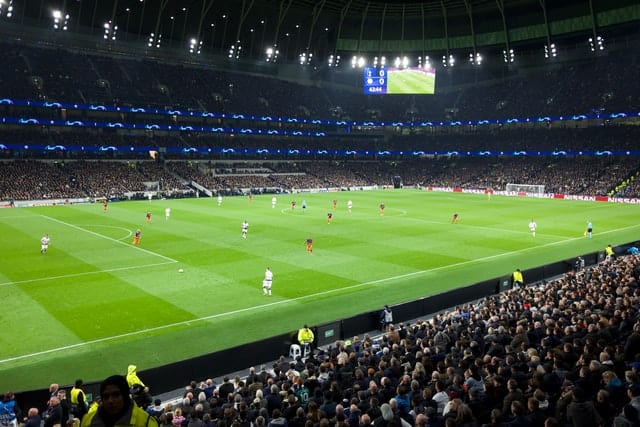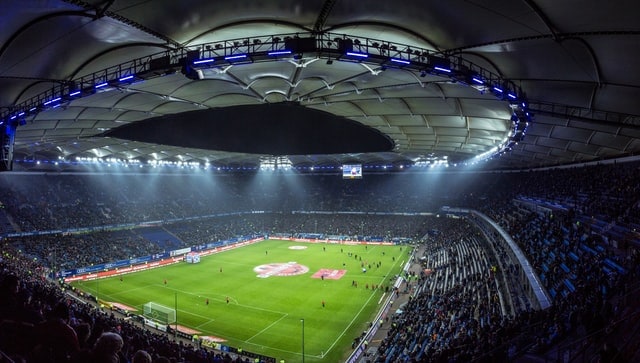If you are a fan of the Major League Soccer (MLS) of America, then you most probably know that the playoffs are one of the most exciting phases of the American soccer league.
The top soccer clubs from all over America participate in the playoffs and compete against each other to win the MLS Cup title. The way the MLS works is interesting, but do the top European soccer leagues work the same way?
Or in other words, do the European countries adopt the playoffs competition in their top soccer leagues?
None of the top 5 European domestic soccer leagues have adopted the playoffs that the MLS has. Instead, the top European soccer leagues just use the points system to determine a single winner for the League competition. However, there are big European soccer competitions that work in a way that is similar to the MLS playoffs.
Also, some of the lower division leagues in many European countries have playoffs, but not in the ways that you would expect. More on this later in this article.
It’s worth mentioning that the top European countries in terms of soccer are not the only countries that do not adopt the MLS’s playoffs in their main domestic league.
Most of the other countries around the world also prefer to separate their main soccer league competition from any other competitions that are similar to the playoffs that the MLS has.
How do the European domestic soccer leagues work compared to the MLS?
If there aren’t any playoffs in the top domestic soccer leagues of the European countries, then how does the league season end and how does it really work?
To put it simply, the European soccer Leagues work in a way that is similar to the regular-season of the MLS. In other words, the team with the most number of points at the end of the season wins the competition.
Each soccer club from the league will face all the other clubs twice. One of each of these games will be a home match, and the other will be an away match.
Every team gets 3 points for winning a match, 1 point for a draw, and 0 points if they lose. After all of the clubs in the league finish their matches, the club with the highest number of points wins the league and there are no playoffs played after the season ends.
So in other words, the European country league titles are similar to the Supporter’s shield of the United States’ soccer, but they are usually given much more significance since they are the main domestic soccer competition in each of the European countries.
If you want to learn more about how the top domestic soccer leagues in Europe work (i.e. Premier League, La Liga …), then check this article that goes in depth about the topic.
What’s the equivalent of the playoffs in Europe?
It’s true that the playoffs that Americans know aren’t a thing when it comes to the top European domestic soccer leagues. However, that doesn’t mean that competitions that are similar to the MLS playoffs do not exist at all.
For example, most of the countries in Europe have another soccer competition that is played similar to the way the MLS playoffs are played. These competitions are usually known as the “Cup Competition”. Spain’s Copa Del Rey is an example of one of these competitions.
The way these cup competitions work is that the teams that qualify for the competition will have to face their opponent either in a single match or in a two legged match depending on the rules set by the soccer association of each country.
The winner of the match advances forward to the next stage of the competition and the loser gets out, which is how the MLS playoffs work.
Another European competition that has something similar to the MLS playoffs is the UEFA Champions League competition which is arguably the best club soccer competition in the world.

In this competition, the top soccer teams from each of the top domestic soccer leagues in Europe compete against each other every year to win the prestigious title.
The champions league competition first starts with group stages. The 32 competing teams are divided into 8 groups of 4 teams.
After the teams in each group compete against each other the same way they do in a regular country league competition (i.e., the teams are ranked based on points), the top 2 teams from each group advance to the knockout stage which is equivalent to the MLS’s playoffs.
During each of the knockout rounds, half of the teams get eliminated out of the competition until one team makes it till the very end and wins the title.
The playoffs of the lower division European Leagues.
It’s true that the main domestic leagues in Europe do not have any playoffs, however, playoffs do exist in the lower soccer divisions of many European countries.
If you don’t know what the second division leagues mean, they are basically leagues that work very similarly to the first division leagues (The top league in each country), but their whole purpose is to give soccer clubs a chance to compete in the first division league.
For example, in Spain, the top 2 teams of the second division league get promoted to La Liga (the first division league), AND, the teams who ranked from 3rd to 6th go for playoffs that decides the 3rd club that’s going to get promoted to the first division league.
So, playoffs do exist in the domestic European league competitions, but they are usually only used for the smaller leagues that are barely watched by the soccer fans around the world.
Why aren’t there playoffs in the top European domestic soccer leagues?
The playoffs in soccer can be more exciting than just a bunch of clubs trying to collect points and reach the top of the table. Playoffs are usually more dramatic and the games are in general more competitive because each of the teams know that if they lose, they’re out.

So, why don’t the top soccer domestic leagues in Europe go for post-season playoff competitions?
I believe that the reasons are the following:
1- Keep the domestic league competitive and interesting till the end of the season.
If the most important domestic trophy in a country is the one obtained from playoffs, then the soccer clubs that have guaranteed their spot at the playoffs might decide to drop their performance during the rest of the regular season competitions just so that they keep their energy full for the playoffs.
So in other words, the existence of the playoffs can ruin the regular soccer league that goes on for more than 8 months.
If the European countries make the 8 months long annual soccer seasons boring just to have a 1 month of playoffs, then the finances of most of their soccer clubs will suffer a lot and thus their clubs may not be able to attract the top soccer players around the world.
2- Give a chance for the lower division clubs to compete in a big competition.
I have not mentioned it before, but the “cup competitions” that we talked about earlier in this article do not only include the teams from the first division league of an European country, but they also include small teams from lower divisions.
In other words, the small soccer clubs in many European countries get the chance to compete in a big domestic competition to make themselves known in their country.
However, if the European countries introduce playoffs to their main domestic soccer leagues, then the cup competitions will either be useless or will lose their popularity because the playoffs will be the “Better version” of these cup competitions.
In other words, the smaller clubs will lose their chance of playing in a big domestic competition and they’ll have to financially survive till they make it to the first division league which may never even happen since the competition is insanely tough.
With that said, I will end the article here. Here’s a summary of what you have just read
SUMMARY
The top European domestic soccer leagues do not have playoffs after their regular soccer season ends. However, some European lower division leagues have playoffs that determine which team makes it to the higher divisions.
There are European soccer competitions that work in a way similar to the MLS’s playoffs. These competitions are either the Cup competitions in each European country or the Champions league competition which is a single competition that combines the top soccer clubs from the top European soccer leagues.

